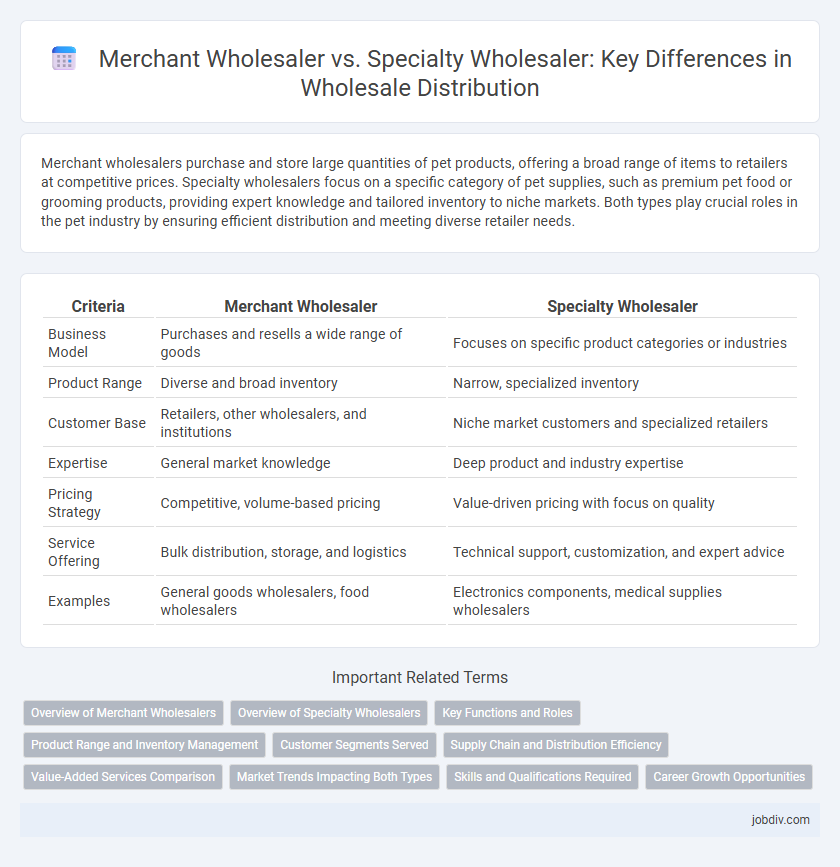Merchant wholesalers purchase and store large quantities of pet products, offering a broad range of items to retailers at competitive prices. Specialty wholesalers focus on a specific category of pet supplies, such as premium pet food or grooming products, providing expert knowledge and tailored inventory to niche markets. Both types play crucial roles in the pet industry by ensuring efficient distribution and meeting diverse retailer needs.
Table of Comparison
| Criteria | Merchant Wholesaler | Specialty Wholesaler |
|---|---|---|
| Business Model | Purchases and resells a wide range of goods | Focuses on specific product categories or industries |
| Product Range | Diverse and broad inventory | Narrow, specialized inventory |
| Customer Base | Retailers, other wholesalers, and institutions | Niche market customers and specialized retailers |
| Expertise | General market knowledge | Deep product and industry expertise |
| Pricing Strategy | Competitive, volume-based pricing | Value-driven pricing with focus on quality |
| Service Offering | Bulk distribution, storage, and logistics | Technical support, customization, and expert advice |
| Examples | General goods wholesalers, food wholesalers | Electronics components, medical supplies wholesalers |
Overview of Merchant Wholesalers
Merchant wholesalers purchase goods in bulk from manufacturers and resell them to retailers, businesses, or other wholesalers, operating with full ownership and responsibility for the products. They provide essential services such as storage, transportation, and inventory management, facilitating efficient supply chain operations. Unlike specialty wholesalers, merchant wholesalers handle a broad range of products across multiple categories, ensuring diversified stock for various market demands.
Overview of Specialty Wholesalers
Specialty wholesalers focus on a narrow product range or industry, offering expert knowledge and tailored services to meet specific customer needs. They often provide value-added services such as product customization, technical support, and inventory management, enhancing supply chain efficiency. Unlike merchant wholesalers who handle diverse product categories, specialty wholesalers build strong relationships within niche markets, driving deeper customer loyalty and higher profit margins.
Key Functions and Roles
Merchant wholesalers primarily purchase, take title to, store, and resell large quantities of goods to retailers or other wholesalers, emphasizing bulk distribution and inventory management. Specialty wholesalers focus on a narrow product range or specific market niche, providing expert knowledge, customized services, and value-added solutions to meet unique customer needs. Both types streamline supply chains but differ in scale and specialization, affecting their roles in product sourcing, warehousing, and customer interaction.
Product Range and Inventory Management
Merchant wholesalers maintain a broad product range, offering diverse inventory to meet varied customer demands, which requires efficient inventory management systems to track large stock volumes. Specialty wholesalers focus on a narrow product category, allowing for deeper expertise and tailored inventory management that optimizes stock levels for specialized items. Both types of wholesalers utilize advanced inventory control technologies, but the scale and scope differ significantly based on product variety and market focus.
Customer Segments Served
Merchant wholesalers primarily serve a broad range of customer segments, including retailers, industrial users, and other wholesalers, offering a wide variety of general merchandise. Specialty wholesalers focus on niche markets and customer segments, providing specialized products tailored to specific industries or consumer needs. Their targeted approach allows specialty wholesalers to build deeper relationships and offer customized services that meet the unique demands of their specialized customer base.
Supply Chain and Distribution Efficiency
Merchant wholesalers maintain large inventories and manage extensive supply chain networks, enabling bulk purchasing and streamlined distribution to various retailers. Specialty wholesalers focus on niche markets with tailored logistics solutions, enhancing distribution efficiency through targeted product expertise and customized supply chain strategies. Both models optimize supply chain performance, but merchant wholesalers emphasize volume and reach, while specialty wholesalers prioritize specialized handling and market-specific responsiveness.
Value-Added Services Comparison
Merchant wholesalers typically provide extensive value-added services such as bulk breaking, inventory management, and customized packaging to streamline supply chains for diverse industries. Specialty wholesalers focus on niche markets, offering highly specialized value-added services like technical support, product training, and tailored delivery schedules to meet specific customer needs. This distinction enhances operational efficiency for merchant wholesalers and deepens customer relationships for specialty wholesalers.
Market Trends Impacting Both Types
Market trends such as digital transformation and shifting consumer preferences are driving Merchant Wholesalers to expand their product range and enhance supply chain efficiency. Specialty Wholesalers benefit from increased demand for niche products, leveraging in-depth industry knowledge to offer tailored solutions and personalized services. Both types face rising pressure to integrate e-commerce platforms and adopt data-driven strategies to stay competitive in the evolving wholesale landscape.
Skills and Qualifications Required
Merchant wholesalers require strong negotiation skills, inventory management expertise, and a deep understanding of supply chain logistics to handle large volumes of products efficiently. Specialty wholesalers focus on in-depth knowledge of specific product categories, technical expertise, and the ability to provide tailored solutions to niche markets. Both roles demand excellent communication skills and proficiency in sales strategies to maintain client relationships and drive business growth.
Career Growth Opportunities
Merchant wholesalers offer broad career growth opportunities through diverse roles in inventory management, sales, and logistics, enabling professionals to develop versatile skill sets applicable across industries. Specialty wholesalers provide focused career advancement by deepening expertise in niche markets, fostering specialization in product knowledge, and building strong customer relationships. Both pathways support upward mobility, with merchant wholesalers emphasizing operational leadership and specialty wholesalers highlighting strategic market positioning.
Merchant Wholesaler vs Specialty Wholesaler Infographic

 jobdiv.com
jobdiv.com